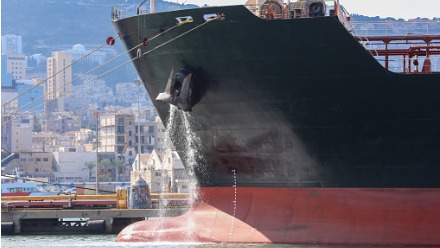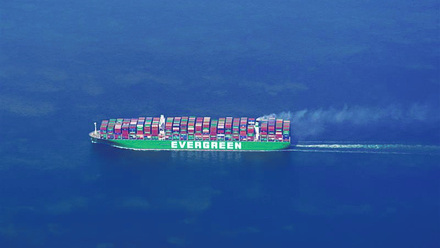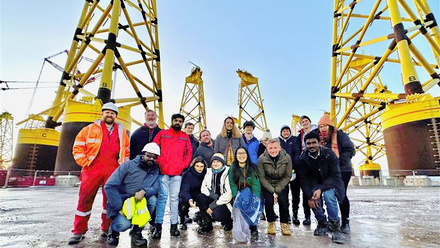IMarEST into 2025: tackling key challenges
The maritime and marine industries stand at a critical juncture as we approach the new year.
Moving into 2025, the world faces mounting environmental pressures, shifting economic priorities, and the urgent need for a sustainable future. Addressing these challenges will demand coordinated efforts, innovation, and an unwavering commitment to progress across the sector.
Here we lay out the main areas requiring focus to build a resilient and sustainable maritime future.
Decarbonisation and emissions reduction
In line with global climate goals, reducing emissions has become one of the industry’s most pressing priorities. Decarbonising the sector requires a substantial shift toward low- and zero-carbon fuels such as hydrogen, ammonia, and methanol, alongside emissions control technology. This transition will involve not only innovation but also commitment from companies, policymakers, and industry bodies alike, as we aim to support a cleaner, more sustainable maritime future.
Read more: Why green ports are key to shipping hitting net zero targets
Sustainable ocean economy and biodiversity protection
The ocean is a vital resource for the global economy and environmental health. However, threats like pollution, overfishing, and seabed mining jeopardise marine biodiversity and disrupt ecosystems. Moving forward, the sector must work to integrate sustainable practices, minimise its environmental footprint, and adopt a stewardship role that helps balance economic interests with biodiversity conservation and ocean health.
Digitalisation and cybersecurity
As digitalisation transforms maritime operations, it brings efficiency gains but also introduces new vulnerabilities. With increasing digital threats, cybersecurity has become an essential focus for protecting data, safeguarding assets, and ensuring resilient operations. Addressing these cyber risks must become an industry-wide priority to sustain digital innovation while maintaining robust security measures across maritime networks and assets.
Skills shortage and workforce training
The shift towards alternative fuels, automation, and advanced digital systems has created a growing need for specialised skills in the maritime workforce. To bridge this skills gap, the sector needs a significant investment in training and development to prepare current and future workers. Ensuring a pipeline of skilled professionals is critical for continued innovation and the successful transition to sustainable operations.
Read more: Dedicated training ships aim to tackle seafarer shortage
Safe adoption of alternative fuels
The adoption of new fuels is essential for decarbonisation, but it introduces safety challenges and infrastructure requirements that must be carefully managed. Developing safe handling procedures, storage facilities, and dedicated port infrastructure is crucial to realising the full potential of low-carbon fuels. Industry-wide collaboration will be necessary to build the foundations for a safe and efficient alternative fuel network.
Read more: Hydrogen testing facility expands to beat competition
Climate change adaptation and resilience
As sea levels rise and extreme weather events increase, the marine sector must prioritise resilience in its infrastructure and operations. Adapting to climate impacts will require innovative designs, resilient infrastructure, and comprehensive risk management strategies to withstand environmental changes and safeguard essential operations.
ESG compliance and responsible governance
Environmental, social and governance (ESG) standards are more than just a regulatory requirement, they represent a commitment to responsible and sustainable industry practices. The maritime sector must continue to embrace ESG principles, ensuring transparency and accountability. By embedding ESG into company operations, the industry can meet the rising expectations of investors, consumers, and stakeholders while aligning with a sustainable future.
Navigating regulatory challenges
Evolving international regulations continue to impact the maritime industry. From emissions targets to safety standards, adapting to these regulatory shifts is vital for industry compliance and alignment with global standards. Remaining agile and proactive in response to these changes will help ensure that the sector meets evolving expectations and contributes to a responsible and compliant global maritime industry.
Read more: Keeping small ship standards ship shape
Seafarer health and wellbeing
Seafarers are the backbone of the maritime industry, yet they face unique challenges that impact both physical and mental health. Isolation, long hours, and challenging work environments all take a toll. Improving conditions for seafarers is essential to the sector’s resilience and will require more robust support systems, improved connectivity, and a focus on overall quality of life.
Read more: Support not stigma for seafarers with mental health issues
Enhancing industry reputation and public perception
A sustainable future requires broad support and understanding from the public. The maritime sector must work to foster a positive reputation, showcasing its commitment to environmental responsibility and innovation. Strengthening public trust and improving the sector’s image will be key to securing a future where the industry continues to thrive and evolve in harmony with society’s environmental and economic goals.
Main image: vibrant coral reef thrives near Alor, Indonesia; credit: Shutterstock.
Tell us what you think about this article by joining the discussion on IMarEST Connect.





